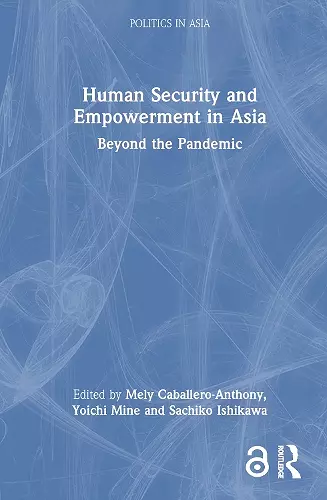Human Security and Empowerment in Asia
Beyond the Pandemic
Yoichi Mine editor Mely Caballero-anthony editor Sachiko Ishikawa editor
Format:Hardback
Publisher:Taylor & Francis Ltd
Published:26th Oct '23
Currently unavailable, and unfortunately no date known when it will be back
This hardback is available in another edition too:
- Paperback£39.99(9781032554426)

This insightful volume revisits human security and development through the lens of empowerment, particularly in the context of COVID-19's impact on vulnerable populations.
In the wake of the global COVID-19 pandemic, Human Security and Empowerment in Asia serves as a vital resource that reexamines the frameworks of human security and development. This edited volume explores the intricate relationship between protection and empowerment, particularly as it pertains to vulnerable groups and populations adversely impacted by the pandemic. It highlights the need to shift focus from traditional top-down protection methods to more inclusive, bottom-up empowerment strategies that engage and uplift those most affected.
The contributors delve deeply into the protection-empowerment nexus, presenting a series of case studies from Southeast Asia and Japan. These case studies illustrate how various communities have navigated the challenges posed by the pandemic, emphasizing the importance of agency among vulnerable populations. By providing both theoretical insights and practical applications, Human Security and Empowerment in Asia encourages readers to rethink the role of individuals and communities in addressing their own security needs.
Key human security issues such as poverty, environmental concerns, food security, forced migration, gender inequality, health disparities, aging, peace, and justice are explored throughout the chapters. The COVID-19 pandemic has exacerbated these challenges, making this volume an essential read for students and scholars interested in understanding the broader implications of human security in the current global landscape. The Open Access version is available under a Creative Commons license, ensuring that this critical knowledge reaches a wider audience.
For scholars and practitioners who intend to place human security at the center of a post-COVID-19 era, the case studies in the volume offer a truly thought-provoking investigation into protection and empowerment and their roles in addressing the needs of vulnerable communities experiencing the effects of compounded human insecurities. Prior to the pandemic, the communities examined here were already experiencing diverse insecurities due to poverty, food shortages, and forced migration due to conflicts or disasters. The research case studies eloquently steer away from stove-pipe approaches, and embrace a multi-disciplinary comprehensive approach in "solidarity," as argued in the 2022 UNDP Special Report, New Threats to Human Security in the Anthropocene. Research also reveals how ideas for empowerment can emerge from the process of protection. Three decades after the launch of the human security concept, the operationalization of human security is being severely scrutinized. This book offers a conceptual and practical guide map to its deployment.
Akiko Fukushima, Senior Fellow
Tokyo Foundation for Policy Research, Japan
The pandemic has caused havoc around the world—particularly in vulnerable communities—whether in the Global South or the Global North. This book provides an evidence-based account of how people and communities were affected by the COVID-19 pandemic in various parts of Asia, and how they have overcome the structural barriers through empowerment in critical cases of human security. This is a must-read for policymakers, academics, and students who have understood that the concept of "human security" can provide a powerful tool to analyze and provide practical solutions for "freedom from fear, freedom from want, and freedom to live in dignity" for all.
Eun Mee Kim, President, Professor
Ewha Womans University, Seoul, South Korea
The concept and practices of Human Security face serious challenges, not least of which is a resurgence of traditional geopolitical visions of security focusing upon military defense, reinforced by a rise in nationalism and great power rivalry. Yet, the current polycrisis demonstrates that Human Security, as a guide to policy, is needed more than ever. This excellent book explores the importance and feasibility of Human Security in East Asia, in response to COVID-19 and development challenges, amongst others. Building upon the internationally leading research undertaken by the JICA Ogata Research Institute in the field of Human Security, it is conceptually rich and empirically rigorous, while demonstrating how ideas can have a positive impact upon people’s lives.
Edward Newman, Professor of International Security
University of Leeds, UK
Human security is a beautiful concept that needs to be effectively operationalized, and this book aims to do just that by focusing on specific vulnerable populations in Japan and several Southeast Asian countries. The ten chapters cover a wide range of issues that scholars would find conceptually, theoretically, methodologically, and empirically stimulating and refreshing in light of COVID-19. I highly recommend this valuable book to everyone interested in delving into the latest research in the post-COVID world.
Sorpong Peou, Professor; Graduate Program Director
Toronto Metropolitan University, Canada
Over the past decade, JICA Ogata Sadako Research Institute for Peace and Development (Previously JICA Research Institute) has yielded numerous impressive products. This volume is a continuation of its path-breaking work in the field of human security. This book can be widely used in classrooms and research offices.
Ren Xiao, Professor
Fudan University, Shanghai, China
ISBN: 9781032554433
Dimensions: unknown
Weight: 453g
228 pages